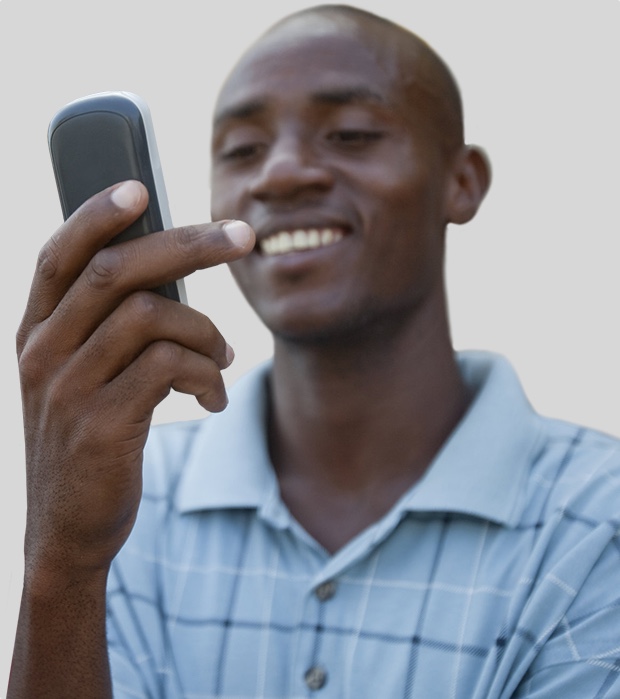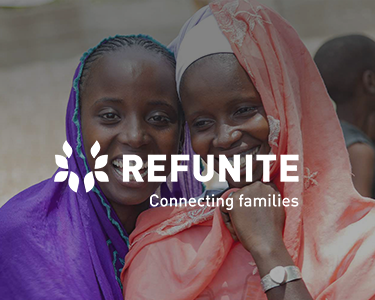
Ida Jeng, REFUNITE’s Director of Global Communication and Strategy, shares photos and observations from a recent mission to Goma in the Democratic Republic.
The Democratic Republic of the Congo (DRC) is home to 2,756,585 internally displaced people and 119,754 refugees. Fleeing violence and political turmoil, many families head to Goma in Eastern DRC, where they often face poverty and unpropitious prospects. A landscape awash in rainforest, Goma lies next to Lake Kivu and Rwanda. Like the DRC itself, Goma is a place of juxtaposition. On the one hand, Goma offers natural resources, diamonds and tropical forests ideal for exploration. On the other hand, Goma means overcrowded and underfunded camps, lack of sanitation and attacks from rebel groups. Such is everyday life for families in Goma.
How can we, as a technology organization, ease the burden for separated families by making it easier for them to reconnect with missing loved ones? How can we optimize our activities in the DRC both from a product, a communication, and a user experience perspective? These were some of the underlying questions that shaped my mission to Goma.
More than 59 million people have been forcibly displaced globally; the biggest displacement crisis since World War II. The current number of refugees is surpassed by the growing number of internally displaced people in the world, also known as “IDPs”. This crisis is especially apparent in the camps that I visited during my stay in the DRC, including Mugunga 1, Bulengo and Mugunga 3.
In Goma you’ll find women, children and families searching for not just one, but several lost family members. A welcomed reminder of the invisible tragedy that is family separation.
Goma serves as a strategic hotspot for REFUNITE. Together with Vocadom DRC and Ericsson, we’ve launched a series of family-tracing activities: a free mobile search tool that empowers families to search from a low-cost mobile phone and a free helpline. We’ve sent out more than 2 million text messages to generate awareness around our services. We’ve reconnected over 900 families, and I’ve been fortunate enough to meet some of these families myself. One memory, which definitely won’t fade, was my interview with two Congolese sisters. They were reconnected in Kakuma Refugee Camp after 11 years apart (read their story here).
Yet, much has changed since we launched our first SMS campaign in the DRC in 2013. Open the newspaper, and you’ll find heart wrenching stories of families fleeing violence in fragile Burundi; many choosing to cross into the DRC. Turn on the radio, and there — again — are the stories of political unrest in the Central African Republic (CAR) and Rwanda, which has left thousands of families without shelter. During our stay in Goma, we got to talk to several families and organizations. It soon became apparent: we rapidly need to change our current geo-targeting strategy for the DRC. In addition to Katanga and Kivu, where we’ve promoted REFUNITE’s services through SMS, we have to launch new campaigns in Equateur (home to refugees from CAR), South Kivu (home to many refugees from Burundi) and North Kivu (home to refugees from Rwanda.)
REFUNITE works under the belief that everyone has the right to know where their family is. Joining me on my mission was Rody, a team member of REFUNITE. Rody’s own story is symbolic of the stories that are so common in the DRC: he, too, has had to flee the DRC twice, in 2007 and 2009. He now lives as a refugee in Uganda and used to head REFUNITE’s mobile outreach programme for urban refugees. For Rody, the trip to Goma was ‘more than work’. He also got an opportunity to reconnect with his sister, whom he hadn’t seen for years. Keeping with REFUNITE’s goal of developing our products in camps instead of conference rooms, we tested our mobile search tool among separated families. A “REFUNITE mission” usually entails a 180-degree evaluation of our product. From push-notifications to text strings, search algorithm and code. Is each mobile frame easy to understand? Are the French and Swahili translations correct? How many minutes does it take to register using mobile?
Walking from tent to tent with a paper-based prototype in hand often lead to aha-moments. We quickly discovered that, while we’ve been able to connect thousands of families from the DRC, we can do better and we can do more to ease the registration process. Bugs are to be expected on any platform, yes. Now couple that with network issues in the DRC, constant power cuts, and a lack of Internet connectivity that hinders access to information and you will soon start scratching your head, wondering: how are we ever going to reconnect families in these challenging settings?
By talking to families in the camps, we learned that there is a need for further localization of our mobile search tool. As an example, we would most likely be able to acquire more Congolese users if we added the Kinyarwanda language to our platform. We would probably also be able to generate more family reconnections by launching more push notifications to ensure that the new users we’re acquiring in Goma will be matched with already-existing Congolese users on the platform. Illiteracy continues to be a challenge in Goma, which is why we’re excited for REFUNITE’s future pilot, which will focus on Interactive Voice Response (IVR). It allows families to register through voice recognition. These are just some of the observations that will have our tech team burning the midnight oil at our lab in Nairobi; always looking for ways to optimize our mobile search tool and improve the search algorithm.
The IDP camps in Goma differ from camps and refugee prone areas I have visited previously, i.e. in Egypt, Tanzania, Uganda, South Sudan, Somalia and Kenya. Most of the families we talked to in Goma owned a SIM-card but no mobile phone. Oftentimes, SIM-cards and mobile phones are traded for food. In the camps in Goma, we only saw one mobile station where families can charge their mobile phone and trade SIM-cards. Not a single smart-phone in sight. Which reminded us that for each time we rally around “the next big idea” in our Nairobi-lab, we have to ponder: will this new, cool feature work on, for example, an old-school Nokia phone?
We also got to sit down with radio stations in Goma and experienced first-hand the hospitality the DRC is known for. In fragile states, such as the DRC, radio is often the most effective way of communicating directly with families living off the grid. There was the charismatic radio host from Kivu 1 who committed to donate airtime and a radio show about REFUNITE exclusively. There was the spirited and fast-talking radio owner of Radio Michapi who committed to launch a radio campaign to promote REFUNITE’s service. Asked about when we can start our SMS campaigns, he responded: yesterday!
Back in Nairobi, the pursuit for the optimal family reconnection platform continues. The next step is for us to build, test and rejig strategies until we’ve developed the best solutions for families.









